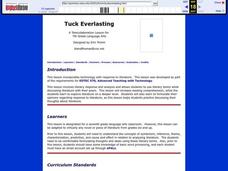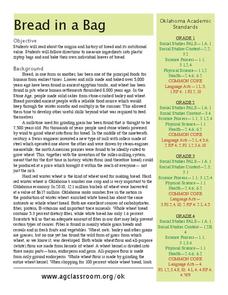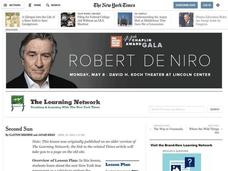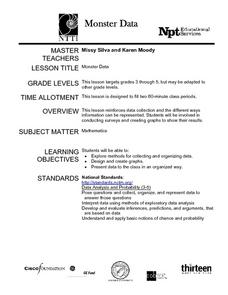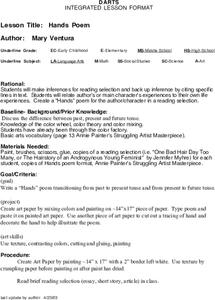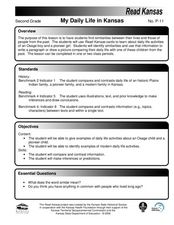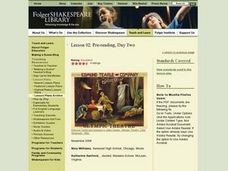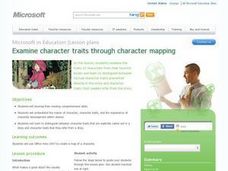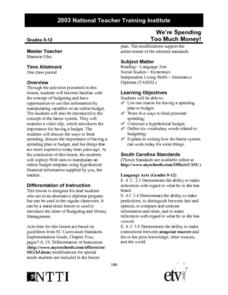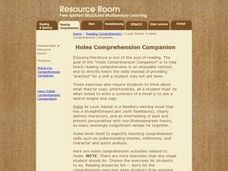Curated OER
Tuck Everlasting
Seventh graders use literary terms while discussing literature with their peers. They explore literature on a deeper level. Students formulate their opinions regarding response to literature, as this lesson helps students practice...
Curated OER
Teaching Inference with Trash and Mystery Objects
Students practice solving mysteries and using inference skills by digging through trash. In this problem solving lesson, students investigate groups of garbage to determine what type of person the garbage belonged to....
Curated OER
Call It a Hunch
Give young scholars a chance to practice making inferences after reading the book Through My Eyes by Ruby Bridges. They confirm whether or not their conclusions are true, have a class discussion, and then independently complete an...
Curated OER
Bread in a Bag
Could the history of bread really be interesting? Yes, it could! An informational text gives scholars wheat production background from 8,000 years ago, discussing different types of bread and the current industry in Oklahoma. Learners...
Curated OER
Archeology Lesson; Making Inferences
Students discover what an archeologist is and make inferences about societies and cultures based on artifacts. In this archeology lesson, students complete an array of captivating activities, guessing about what an artifact is...
Curated OER
Second Sun
Explore the elements of newspaper from the view of the front page. Young analysts create a front page of a newspaper geared toward teen readers. They use their inference skills to determine why some front pages are more eye-catching than...
Curated OER
Monster Data
An inventive instructional activity shows learners how to collect, organize, and present mathematical data. They access websites which lead them through a variety of ways to engage in data collection. They get to design and create...
Curated OER
Archaeological Study
Students analyze the difference between archaeology and anthropology while studying the evolution of different products. In this archaeology and anthropology lesson, students trace the progression of a certain tool or product and come up...
Curated OER
Inspector Readers: The 002 Book Club
This unit introduces book clubs/literature circles to lower elementary classes, but could be adapted to higher grades. It outlines the anticipatory activity that includes a WebQuest, a discussion to clarify questions about the unit,...
Curated OER
Hands Poem
Students create a "Hands" poem for the author/character in a reading selection.They make inferences for reading selection and back up inference by citing specific lines in text. They relate author's or main character's experiences to...
Curated OER
My Daily Life in Kansas
Second graders use 'Read Kansas' cards to learn about the daily life activities of an Osage boy and a pioneer girl. In this similarities and differences lesson, 2nd graders write a paragraph and draw a picture comparing...
Curated OER
Shakespeare: Julius Caesar
Before your high schoolers read Julius Caesar, have them complete this thought-provoking activity! To familiarize them with some of the play's most important lines, break the class into pairs and have them create a skit around...
Curated OER
African Folktales Lesson
Students explore what a folktale consists of as it relates to oral tradition. In this folktale lesson, students are told the African folktale, Why the Sun is Lives in the Sky and make personal inferences about what the folktale is...
Curated OER
What's the Best Deal?
Students explore number sense by solving consumer math problems. In this pattern identification lesson plan, students analyze a list of numerical and geometric patterns while predicting the future outcome. Students utilize inference...
Curated OER
Examining Character Traits through Character Mapping
Some of what we know about a character is directly stated. Some of what we know is inferred by events in the story. Character maps help primary learners recognize the difference. After modeling with a story your class has read, pupils...
Curated OER
Organizing Data Using Tables and Graphs
Students create graphs and tables, as well as interpret and make inferences from the data shown to determine when and where graphs and tables are most useful.
Curated OER
Designing a Real Life Ecosystem!
Students research abiotic and biotic factors concerning the concept of an ecosystem. Record and analyze data collected. Write a lab report in proper and scientific format with thinking and analytical skills. Work as a cooperative team.
Curated OER
Guess Who's Coming to Dinner?
Who would you love to see at your table? Groups research a decade, ranging from the 1840s to the 1960s, read a short story associated with that decade, and plan a dinner party, complete with table set-up and menu. After researching...
Colorado State University
If You Can't Predict the Weather, How Can You Predict the Climate?
Why is the weather man wrong so often? Young climatologists discover how chaos rules both weather and climate through a math-based activity. Using an iterative equation, the class examines how small day-to-day weather events total up to...
Curated OER
The Diary of Anne Frank
Eighth graders read the Diary of Anne Frank. In this novel reading instructional activity, 8th graders read and analyze the story. Students do online activities and create a newspaper giving a summary of three major events in the story....
Curated OER
We're Spending Too Much Money
Learners discuss the reasons for having a budget. They create their own personal budget and explain how the bartering system can work for some items today.
Curated OER
Holes Comprehension Companion
Here is a one-stop planning resource for Louis Sachar's Newbery Award-winning book Holes. You'll find 21 links to worksheets and various activities designed to span the entire book. Learners draw to help analyze settings and...
Curated OER
Medical Explorer
After reading a case study, pupils will explore possible diagnoses, assessment, and treatment plans. Finding the definitions to medical vocabulary and sorting through patient history, they will begin to understand the process of...
Curated OER
Sound Walk: Discovering Data and Applying Range, Mode, and Mean
Elementary schoolers sharpen their listening skills as they use sound maps, tallies, and line plots to organize and interpret data. Everyone takes a "sound walk," and focuses on the sounds around them. They chart and tabulate the sounds...
Other popular searches
- Teaching Inference Skills
- Inference Skills First Grade
- Reading Inference Skills
- Powerpoint Inference Skills
- Inference Skills in Reading
- Inference Skills Worksheet
- Science Inference Skills
- Inference Skills Sixth Grade
